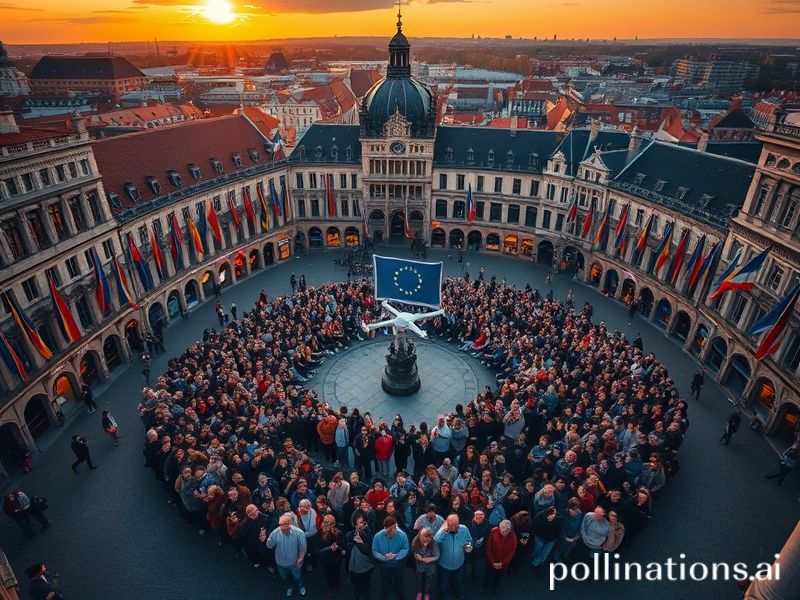Inside the EU’s 27-Nation Group Therapy: Why the World Still Takes Notes
The EU: A 27-Nation Group Therapy Session the World Can’t Leave
Brussels, Belgium – If the planet were a dysfunctional family reunion, the European Union would be the cousin who keeps renegotiating the seating chart while the house is on fire. Twenty-seven countries—give or take one melodramatic ex-member sulking on the lawn—have voluntarily locked themselves into a monetary, legal, and emotional union so intricate that even Kafka would suggest they maybe chill out. And yet, from Beijing to Brasília, what happens inside this gilded cage still ripples outward like cheap wine spilled on silk.
Take the euro, that architectural marvel of shared currency. Tourists think of it as the magical coin that lets you buy gelato in Naples with the same jingle you used for herring in Hamburg. For traders in Lagos or Jakarta, however, the euro’s heartbeat is a daily reminder that when German inflation hiccups, Nigerian Eurobond yields catch a cold. The currency’s very existence is a wager that Greeks and Dutch can indefinitely agree on how much inflation is too much—which is a bit like asking cats and vacuum cleaners to co-author a peace treaty.
Meanwhile, the EU’s Green Deal—essentially a pledge to go net-zero while still flying the CEO of Lufthansa to Davos—has become the global benchmark for climate virtue. Washington frets it’s falling behind, Beijing copies the legislation by lunchtime, and poorer nations wonder if they’ll be locked out of European markets for the crime of wanting a turn at industrialization. The continent that perfected the smokestack now sells absolution in the form of carbon credits, a financial instrument somewhere between papal indulgence and Pokémon cards.
Migration policy offers another act in the tragicomedy. Europe’s southern shores serve as the stage where North African desperation meets Central European obstinacy. Every rubber dinghy that wobbles toward Lampedusa triggers a chain reaction: Budapest builds another fence, Paris relocates asylum seekers like chess pawns, and Australian newscasts recycle the footage to justify their own offshore detention spas. The EU’s inability to craft a collective response is, paradoxically, the most consistent European export since the Black Death.
Defense is where the farce turns positively Beckett. While Washington nags Europe to “take responsibility,” France pushes an EU army that would speak twenty-seven languages and fire blanks unless the paperwork is triple-stamped. Meanwhile, Poland shops for American nukes like they’re limited-edition sneakers. The result is a continent that spends more on bureaucracy per battalion than any empire in history, yet still can’t agree on what to call the war on its eastern doorstep. (Kyiv prefers “existential struggle”; Berlin hedges with “special military inconvenience.”)
Of course, none of this stops the EU from lecturing the world on rule of law—delivered in perfect legalese, footnoted and cross-referenced—while member states quietly backslide on press freedom and judicial independence. Hungary’s media landscape resembles a state-run Netflix with only one genre: Orbán. Poland’s courts moonlight as legislative branch fan fiction. Yet Brussels keeps sending subsidies, because cutting them off would mean admitting the experiment has hairline fractures. Better to apply another layer of varnish and hope the termites hold off until after the next summit.
Still, dismissing the EU as an overpriced debating club misses the point. When the bloc sneezes—whether over energy prices, AI regulation, or olive-oil subsidies—the world scrambles for tissues. Multinationals calibrate supply chains to Brussels standards because rewriting the rulebook 27 times is bad for quarterly earnings. African cocoa farmers learn GDPR compliance the way previous generations memorized catechism. And every time the European Central Bank adjusts interest rates, a forex trader in Singapore updates his résumé.
In the end, the EU is less a superstate than a grand collective delusion that sovereignty can be pooled without anyone actually surrendering it. It’s messy, hypocritical, and occasionally borderline suicidal. But compared with the alternative—unchecked nationalism with nuclear seasoning—it remains the world’s most ambitious experiment in not murdering each other over soccer scores. And if that isn’t worth a sardonic toast with an overpriced Belgian beer, what is?







